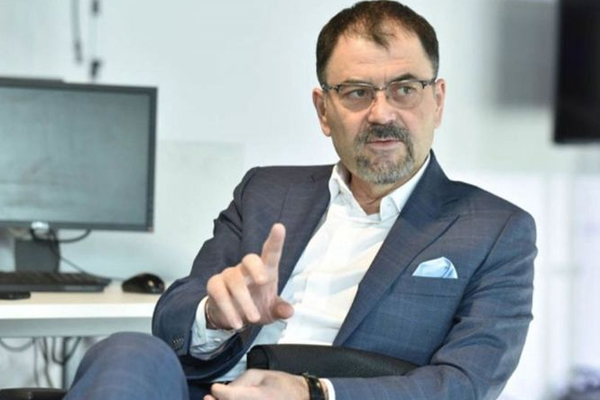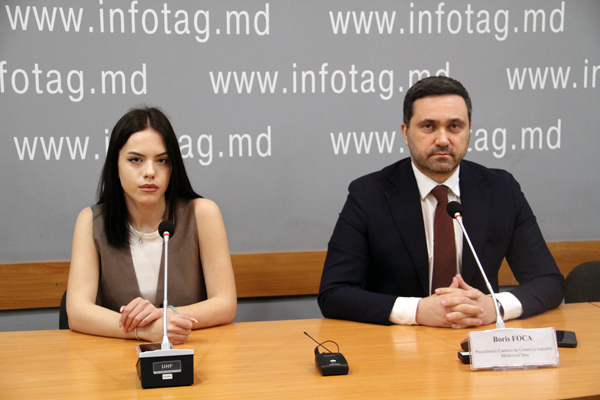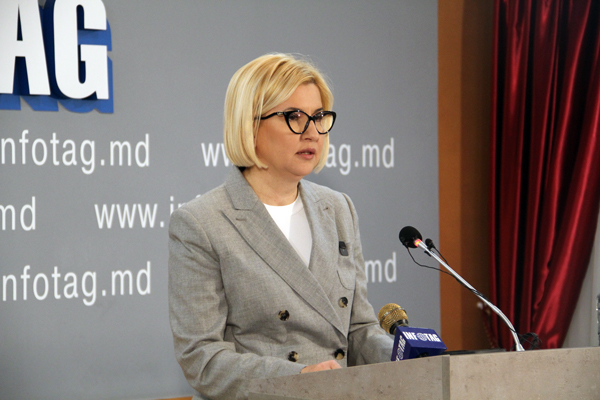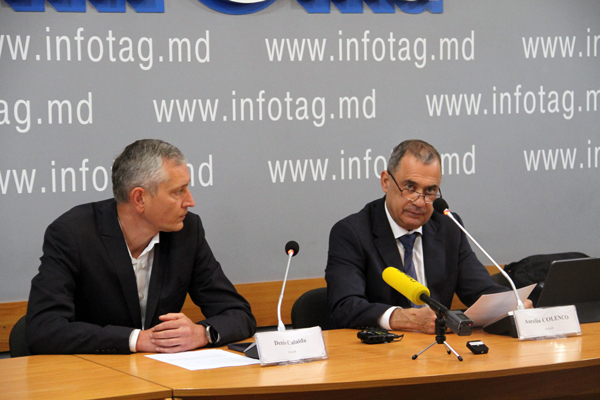Interview
ANATOL SALARU: "MOLDOVA IS PART OF RUSSIA'S HYBRID WARFARE"

The former Moldovan Defense Minister and founder of the National Unity Party, Anatol Salaru, announced that he is leaving politics to devote himself to fighting Russian propaganda.Salaru announced on his Facebook page that he supports Ukraine and believes that people "must know the truth and receive reliable information to be able to distinguish truth from lies." "I am leaving politics now because I want to fight Russian propaganda effectively, I want to share my knowledge. I know how we can fight the poison Putin is trying to spread both in Moldova and in the European Union, so I want to devote myself fully to this work," Salaru wrote.In an exclusive interview with the INFOTAG news agency, he spoke about his vision for solving the problems faced by Moldova in the context of the war in Ukraine.
"INFOTAG": Mr. Salaru, Moldova's defense ministry budget was significantly increased in 2023, but it never came close to the standard of 2% of GDP - the practice of financing defense agencies of Western countries. How much is Moldova able to cover defense expenditures as a percentage?
Anatol Salaru: The defense spending of 2% is the practice of the NATO member states. For example, in Switzerland it is 6%. That is, neutral countries pay 2-3 times more than the figure you cite. Therefore, even if Moldova spends 20% or 50% of GDP, it will still not achieve significant results or dramatic progress.
To become a country with a strong and combat-ready army, the republic has to spend a lot on the armed forces. And it is not only a question of modernization of the army as such and the purchase of weapons in the form of anti-aircraft systems and missiles to them. It is necessary to remember that for the last 25 years the rhetoric that "we don't need the army" dominated in the minds of citizens of Moldova and politicians. Now, "Ukraine's neighbor wants to become our neighbor," and therefore Moldova may face very big problems. And it should be understood that "this neighbor will then want to become a neighbor to Romania, and then to Bulgaria and Serbia.
And in order for Moldova to have a "security umbrella," there are two ways out. The first one is to abandon the notorious neutrality and join NATO. The second one is to integrate with Romania, because association is able to resolve security issues at once. Putin is certainly a man out of his mind, but he will never dare to go to war with the entire North Atlantic Alliance. I emphasize once again that Moldova's expenditures on the army are minuscule and negligible.
When I was Minister of Defense, I saw the transition of the army to NATO standards (DCBI) as one of the priority goals. For example, Finland introduced NATO standards to its armed forces long ago, built a powerful and modern army, and now, when Russia threatened, the country became a NATO member in just a few months, going through all the bureaucratic procedures at an accelerated pace. And the army of Finland meets all the standards of the Alliance, because it gradually and gradually adopted them.
"INFOTAG": There are those who think that Moldova with its GDP of 14,5 billion dollars will not be able to finance the demands of the army soon enough? Where will you get the necessary funds for this?
A.S.: For many years Moldova has been a country which lives only on subsidies, because the country would have gone bankrupt long ago without the help of its foreign development partners (above all, the European Union and the United States). Moldova is unable to provide for itself. Remember that we have recently received wood as humanitarian aid. We didn't have the money to buy anti-hail rockets. At the same time, some people ask in all seriousness, "Why can't Moldova buy Patriot missiles to shoot down Russian missiles flying over Moldovan territory?" The explanation is one thing - Moldova, unfortunately, is a bankrupt state. It has never been a state. Besides, having a grouping of Russian occupation army on its territory, Moldova is not able to build a powerful economy to provide funds for pensions, salaries and needs of modern army.
In this regard, the sectors that will never come out to protest, I mean the military, as civil servants, suffer. Therefore, all governments believed that since the military would never go on strike under any circumstances, they could be provided for last, on a residual basis.
"INFOTAG": Maybe in such a situation Moldova would be better off, so to speak, to have only the Honor Guard Company, but not the army, which the state is not able to finance at a decent level?
A.S.: This idea has been in the air for a long time. By the way, this is part of the Russian hybrid warfare: that Moldova must not have an army, and that Transnistria needs one. Russia, allegedly, should have a military force on the territory of Moldova.
There is a right to life and such an option that Moldova will not have its own army, but it should have serious security guarantees from many countries. But we see from the example of Ukraine that this did not help. In 1994, official Kiev handed over its nuclear weapons to Russia with security guarantees, but it didn't work. Ukraine again declared itself a neutral country, but this didn't help either. The reason is that Russia is not guided by international law in its actions.
One more point. How can Moldova give up its own Armed Forces, when we have a Russian grouping on our territory, and the army of Transnistria is larger than the Moldovan one, and has more weapons?! In such a situation, this Honor Guard Company will not help the security of the country's population in any way.
"I": Moldova and other countries of the region live in anticipation of events on the fronts in Ukraine. What are the possible scenarios that could affect Moldova?
А. S: I said long ago and I will repeat that the Kremlin is going to destabilize the situation in Moldova. The reason is that Russia is very interested in preserving such a bridgehead as Transnistria with its further expansion to the whole right-bank Moldova. Therefore, the Kremlin now considers the overthrow of the government in Chisinau as a wave of "popular anger." This will take place under the guise of "protests and dissatisfaction with politics" in order to force the current majority to resign and organize early elections.
Because of the mistakes really made by the Moldovan authorities, and with Russian money, the current opposition, the “Shor” Party and the Party of Socialists, have an opportunity to win early elections. They are able to collect together more than 50% of the votes. And it will help Russia to keep its political influence here and to establish a legal pro-Russian government in Moldova.
These elections will have to be recognized by everyone, because they will be legal. If they would overthrow the government, and there is no military assistance from Russia, who would recognize such a government? After all, it is no secret that for centuries Moscow has not changed the vector of its foreign policy - expansion. Now it wants to take control of five former Soviet republics - Moldova, Georgia, Ukraine, Armenia and Kazakhstan. They would like to take over Azerbaijan as well, but Turkey will not let them. In the understanding of the Kremlin, all of these countries should be in Russia's zone of influence. All-round assistance from the West to Moldova indicates that it does not agree with Russia's intention to keep the republic in such a dependent position. The reason is that a "pro-Russian Moldova" is more of a problem for both Ukraine and NATO.
"INFOTAG": How true is it that the participation of Moldovan servicemen in peacekeeping missions benefits the national army? After all, the Moldovan contingent in Kosovo and Lebanon does not act independently?
А. S.: This is a very important story for Moldova, because the republic is an exporter of security. I myself visited the Moldovan contingent in Kosovo as a minister, and it's very important that the Moldovan and foreign armies practice teamwork there, learn NATO weapons, equipment, and operations methods. They are getting to know their colleagues there from different countries.
It should be noted that this is also a solid pay raise, which is very good for them and their families. This is an incentive for the troops, because our military pay is probably the lowest in Europe. When I was minister, I had talks with Romania about creating joint peacekeeping battalions. One should realize that Moldova could earn a lot of money by having trained contingents of troops under the auspices of the United Nations participate in peacekeeping missions around the world. Unfortunately, this idea has not materialized, because a country has to participate in such type of operations with its own equipment and armament, and Moldova does not have such an opportunity. Together with Romania, our military could have received modern NATO equipment and weapons. Peacekeeping operations are not combat operations, but they are extremely useful for the military in terms of their professionalism.
"INFOTAG": How do you assess the situation with the Transnistrian settlement? Against the background of the events of the last 14 months, do you have the feeling that it is in a deep freeze?
А. S.: You know, there is an expression: "It helps like a massage on a wooden leg." All these movements, these processes of some kind of settlement, have always been beneficial only to the regime in Tiraspol. Moldova has never benefited from it. As long as Russia is in Transnistria, all initiatives will be blocked. Very often, the OSCE has been on the side of Transnistria and Russia, which is why the 5+2 format has to be changed. A peacekeeping mission cannot be carried out by a country that was directly involved in the aggression. And it should be understood that in the early 90's, there was not a civil war in Moldova at all, but a Russian-Moldovan war. And if we call things by their proper names, it was a direct aggression of Russia. There should be a peacekeeping mission under the aegis of the United Nations in the region. Russian peacekeepers can also be included, but only under the auspices of the UN.
"INFOTAG": In a situation where the "5+2" negotiating format does not work, how relevant is it to involve new participants in the settlement, such as Romania?
А. S. It is possible to involve Romania as well. While Moscow was dictating its terms in this format and some participants were on its side, it used it. So far, both the European Union and the United States believe that it is really possible. But over time, in my view, Russia should be excluded from it. It is already obvious that this country is the aggressor. Its goal is to block by any means the resolution of the Transnistrian issue in Moldova's interests.
"INFOTAG": What kind of coercive measures could contribute to Moldova's reintegration?
А. S.: The Moldovan authorities must apply the law. Because both the Gagauz and even those who lived in Transnistria did not suffer from separatism. It was instilled in them. It was instilled in them by politicians, by the military, by criminal leaders.
But Moldova will not use any coercive measures, based on the fact that it considers the residents of these regions, first and foremost, its own citizens. And no coercive measures can be applied against its own people. I am sure that after the victory of Ukraine, many issues, including issues of separatism, will disappear.
Immediately after Kiev's victory, the Russian contingent will also leave. It is the mainstay of separatism in the region, which has a direct influence on the unrecognized leaders of the Transnistrian region.
As for the Gagauz autonomy, we have to remember the purpose for which it was created. To preserve the language and culture of the people. But then, it (the autonomy) turned into a tool against the Moldovan state. And even their desire to open a Russian consulate in Gagauzia in Comrat, to achieve for the Gagauz and Transnistria the right to veto laws on Moldovan foreign policy - this shows that these two regions are tools in the hands of Moscow, directed against the Moldovan state.
"INFOTAG": Thank you for the interview!
























Add Comment